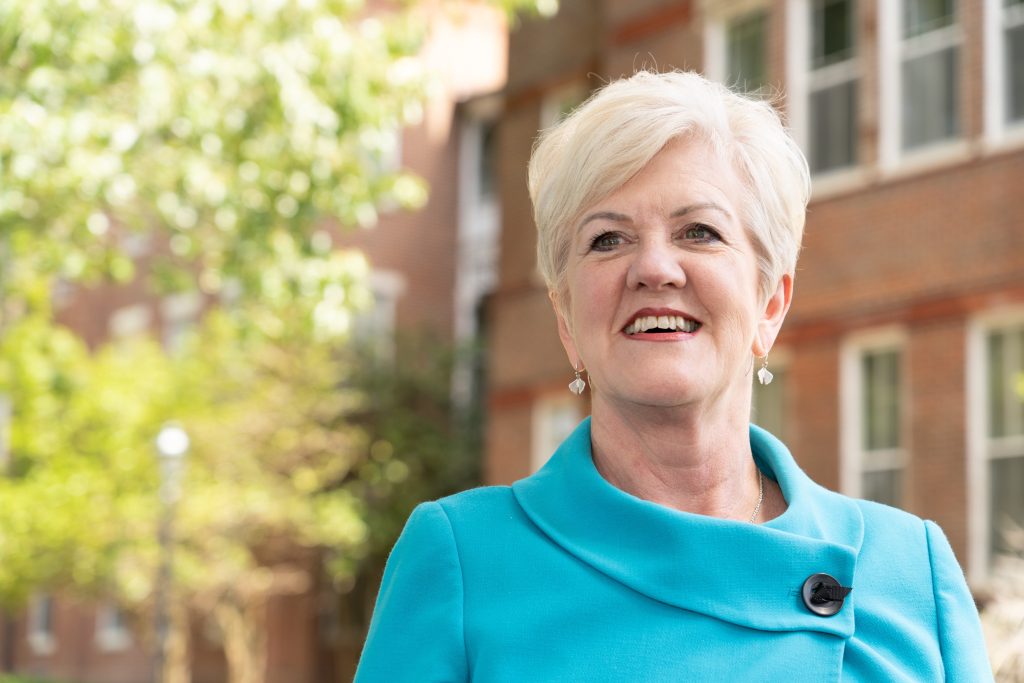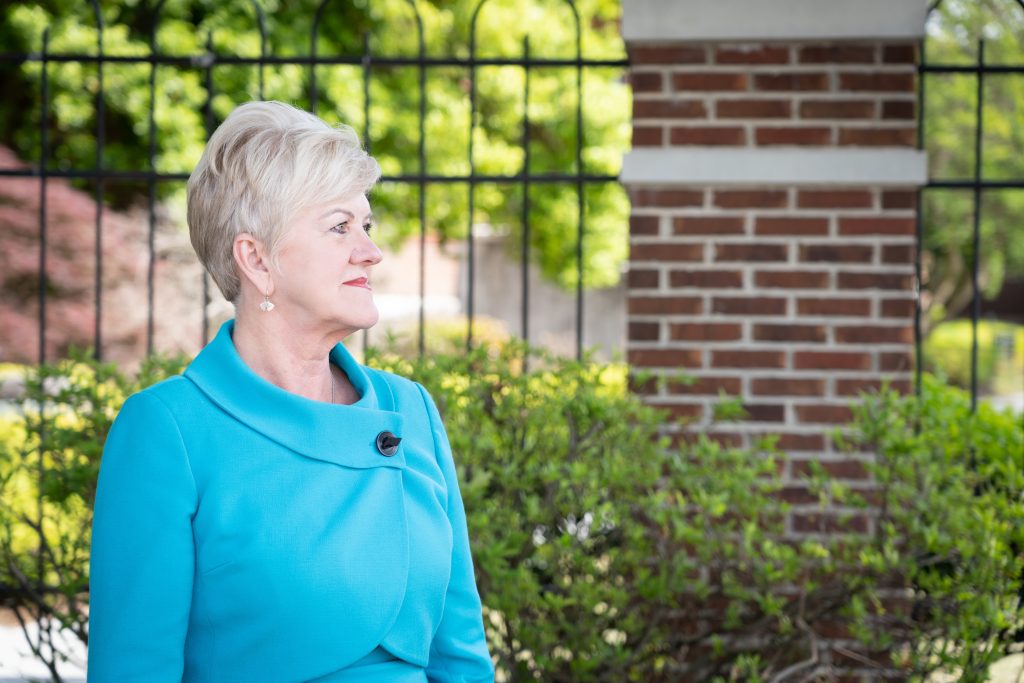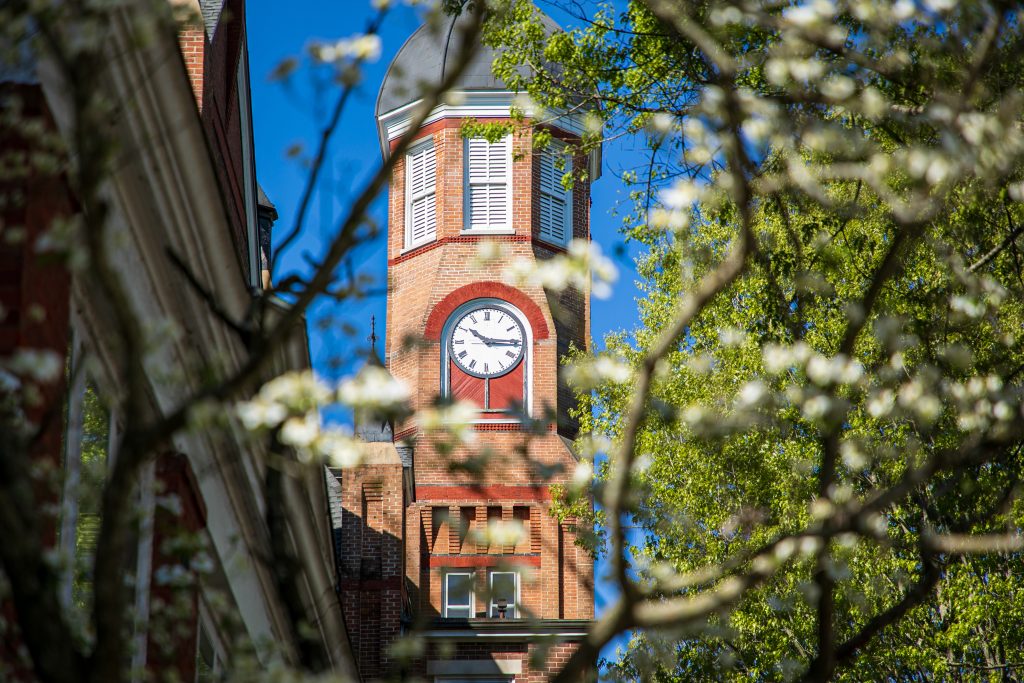Q + A with President Nora Miller

Mississippi University for Women President Nora Miller recently talked with communications specialist Adam Minichino about some of the challenges facing The W in the changing landscape of higher education. One of the primary focuses for Miller, who earned a bachelor’s degrees in business administration and accounting from The W, is leading the university through the process of changing its name. She said it is crucial that the university comes up with a name that is inclusive and resonates with today’s college students and upholds the university’s mission and tradition.
Why is Mississippi University for Women changing its name?
We are facing increased competition for enrollment, and we need to remove any barriers to expanding that enrollment. We have been co-educational for 40 years, and our current name doesn’t describe who we are, it is difficult for marketing, it can be a problem for some of our male graduates when they are applying for positions. It is difficult to deal with, so we need a name that is inclusive and a name that resounds with college-age students of today.
What has been the challenge for you to convey that message to people who enjoy tradition?
We were the first state-supported college for women, and that is very important, but it doesn’t convey who we are today. I think the biggest hesitation is that people fear change. They have concerns that we will abandon our historic mission of advancing leadership and educational opportunities for women. Some of this goes back decades when there was talk of merger or closure and people are fearful of that. I believe a name change will be an impetus for expanding our historic mission of advancing women’s leadership because we have to live it, we can’t rely on the name doing that for us. I am hoping that giving it an extra year before we go before the legislature with this will help us get our message out and select the right name.
We have formed a Women’s Mission Advancement Committee with representatives from each of the colleges and the School of Education, from alumni, university relations, archives and all the faculty in our women’s leadership and our gender studies. The goal of that group is to collect all of the ways we are living that historic mission, how it is built into our curriculum, what events we are having, what kind of research our faculty and students are doing in that area and to really promote all of that.
I want to get out the word at least on a quarterly basis of all the ways we are committed to that historic mission.
You said “We have to live it and we can’t rely on the name.” Times change and the university has changed over the years and it has really made efforts to be inclusive. How do you feel this change can be something that is positive?
I think it is because it opens up the market. We have online programs that have been recognized as some of the best in the country, and we can market those nationally with a name that is more inclusive. Right now to spend the money to market those programs nationally when our name is a turnoff to a lot of people isn’t feasible. I think a name change opens up some additional markets and that is what we really need to be concentrating on because the traditional high school graduate demographic is decreasing. We have to make sure our graduate programs are available to everyone, our programs are available to adults who want to explore a second career and may be place bound. These online programs are very important to our future growth.

The number of high school graduates going on to college is shrinking. How do you feel a name change for The W is part of what the school needs to continue to evolve in a changing landscape?
The number of people choosing college is partly due to a decrease in the number of births 18 years ago, so we have to make sure we’re reaching out to nontraditional students, but also there is so much focus on economic development in the state of Mississippi and having training and promoting community college vocational programs. We need people in all of these areas, and that is why I am so proud of the work we have done in our College of Business building pathways that will accept those technical credits. They want to get out and start making money right away. This gives them the opportunity to stack on those credentials. As they progress in their careers and they want to move into management or into another area, they can complete their four-year degree here and it is a very welcoming environment.
We have the highest percentage of community college transfers of all public master’s institutions, so we are very transfer friendly. While we would love to get all of those students as freshmen, if they are following a different path we have a way for them to complete their journey here, too.
The W has worked hard to build relationships with community colleges in the state of Mississippi. Are those partnerships and pathways that you referred to examples of the positive examples of change and how The W has evolved and continues to adapt to the changing landscape of higher education?
I think it is positive, but, in a sense, it’s recognizing that we have a difficult time competing with free tuition at community colleges. While we continue to pursue freshmen, we want to make sure we have a pathways for them if they choose to begin at a community college.
How has the changing landscape of higher education affected the enrollment at The W and its ability to carry out its mission?
It is something we’re not alone in. The Chronicle of Higher Education recently had an article about the plight of regional institutions. The article highlighted how the flagship universities have deeper pockets and they are outscholarshipping us. We have community colleges reaching up and we have the flagships reaching into our market and we are caught in the middle.
Has the changing landscape affected The W’s ability to continue its mission?
We’re one of 28 states where the flagships have grown in enrollment and the regionals have declined in enrollment, so it is a concern that is shared by other regional institutions. It’s not just happening to us. It’s happening in the entire realm of higher education. We are looking at ways we can improve our recruitment policies and to ensure our retention is high. We’re going to have to continue to look at programs that are in demand in the employment market and that our students want and we are meeting them where they need to be met and making it work without sacrificing the quality of our education.
We were founded to serve an underserved population, and we’re still doing that. We are reaching out to more community college transfers, to more first generation students and to more students from families with lower incomes. We have just expanded that mission. We are an institution of access.

You mentioned some of the issues regional institutions are having, so what sets The W apart from other schools, and how do you think all of the great things here will impact students and help set them on their path to whatever career they select?
I think the fact we have an 11:1 student-to-faculty ratio and that our students and faculty have relationships and bonds that extend outside the classroom give us a family feel on campus. People get to know each other and students are definitely not just a number.
Our faculty rallies around students and helps to provide the resources they need to be successful.
It is difficult for someone who works at The W to describe the genuine bonds that students develop with faculty and staff. Can you speak to that feeling and how many times you have heard those stories and how they are at the heart of what makes The W special?
We have had consultants and people who come here to work on a short assignment and they always say there is a genuine love for our faculty that our students have and it is not something they run across at other universities. We also have had a great run of success with being recognized in U.S. News and World Report’s Best Colleges to Work For. That is based on employees filling out that survey. The employee giving rate is more than double what the national average is. I think those things show our faculty and staff believe in our mission and our students and they are willing to give to make things possible.
How do you think The W can expand its mission to a wider audience and maybe to more nontraditional students?
I think the development of more graduate programs would be one way. We have had great success with our MFA programs, both the Creative Writing and the Theatre Education, which provide a credential for K-12 faculty to advance in their careers. I think we need to continue to build strong relationships with our community colleges and forging those pathways is important for us to do.
I also hope we will be able to develop some new programs particularly with the name change. We have so many industries coming to this area, and I think there are real possibilities for programs that with a different name we would be better positioned to market those programs to those employers and employers in the area.
How does The W continue to build its athletic department to enhance its impact as it transitions to NCAA Division III status?
We will be full-fledged NCAA Division III members in September 2023. We also will be members of the St. Louis Intercollegiate Athletic Conference (SILAC). Having the conference alignment allows us to build some rivalries and relationships. It will help us with easier scheduling of games. We currently have opportunities for postseason play through the United States Collegiate Athletic Conference (USCAA), but this will give us a much broader platform for postseason play.
How much do you think gaining full-fledged NCAA Division III status will allow The W to attract more students?
Students recognize the NCAA name and with most of the Division III schools in the Southeast being private schools, our tuition is a very attractive price point for those students who really want to continue to play athletics and are also serious about their academic endeavors, too.
